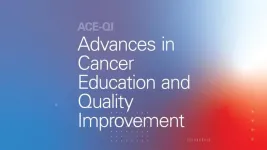(Press-News.org) WASHINGTON, September 29, 2024 — A substantial number of patients with brain metastases who experience cognitive side effects following radiation therapy may fully regain cognitive function, according to a pooled analysis of three large, phase III clinical trials. Recovery was more likely for people treated with conformal, or highly targeted, radiation techniques, compared to standard whole-brain treatment. The findings will be presented today at the American Society for Radiation Oncology (ASTRO) Annual Meeting.
“No longer should we be viewing cognitive dysfunction as a permanent endpoint for patients,” said Hua-Ren Ryan Cherng, MD, lead author of the study and a radiation oncology resident at the University of Maryland Medical Center in Baltimore. “Our research finds that the cognitive side effects of radiation treatment for people with brain metastases appear to be fully reversible, and patients appear to be able to sustain that recovery over the long-term.”
An estimated 30% of all people with cancer — about 600,000 people each year — are diagnosed with brain metastases at some point in the course of their disease. Standard treatment for brain metastases, or cancer that has spread to the brain, often includes either whole-brain radiation therapy (WBRT) or more conformal radiation techniques, which target the radiation dose more precisely to the tumor site and minimize exposure to healthy brain tissue. Cerebral radiation therapy helps prevent the cancer from spreading further inside the brain, but patients may experience cognitive side effects, such as declines in executive function, learning and memory.
The two most common types of conformal radiation are stereotactic radiosurgery (SRS), which delivers fewer, but higher doses of radiation per treatment to the tumor site, and hippocampal avoidance WBRT, which limits radiation exposure to the parts of the brain known to contribute to neurocognitive side effects that occur following treatment. Conformal radiation techniques have been shown in previous research to cause fewer cognitive side effects than traditional WBRT.
Advances in radiation therapy, systemic therapies and other cancer treatments, as well as better imaging that detects disease earlier, have significantly extended survival times for many people whose cancer spreads to the brain. While overall survival rates vary widely among cancer types, some patients with brain metastases live for several years following treatment.
Researchers are now able to focus on a patient’s quality of life for a longer amount of time than was previously possible, Dr. Cherng said. “There’s been a focus in the last decade on approaches to decrease or delay the cognitive side effects of cranial irradiation. We had a lot of data looking at the onset of cognitive changes, but not much data and no randomized trials looking at how these patients fare down the road after developing cognitive side effects.”
“What remained unclear were the long-term outcomes for these patients. Is this permanent, or can they recover cognitive function? People are living years longer now, and there is a growing need for knowledge on how to counsel our patients about their long-term cognitive recovery prospects.” Cognitive recovery is “a novel concept that has not been fully defined” for these patients, he said.
To fill that gap, Dr. Cherng and his colleagues pooled retrospective data from 288 patients with long-term cognitive testing data who participated in three large, randomized phase III clinical trials comparing WBRT to different types of conformal radiation in brain metastases. Cognitive outcomes were the primary endpoint for all three trials. Two of the trials were conducted by the North Central Cancer Trials Group (N107C and N0574) and compared WBRT to SRS; the third, from NRG Oncology (CC001), compared standard WBRT to WBRT with hippocampal avoidance.
To measure cognitive recovery, researchers analyzed results from a battery of cognitive tests administered to the patients before treatment and again at six and 12 months after the onset of neurocognitive function loss.
Six months following the first signs of cognitive decline, 38% of patients experienced full cognitive recovery, rising to 42% of patients at one year. Cognitive recovery was defined as a patient no longer having a significant decrease from baseline cognition scores on every cognitive test. In other words, Dr. Cherng said, patients had to have a complete absence of cognitive failure after initial neurocognitive toxicity to meet the requirements of full cognitive recovery.
And although not all patients made a full recovery, roughly three-fourths recovered at least some lost cognitive function. Six months after treatment, 73% demonstrated improvement on one or more cognitive tests, rising to 76% at 12 months. Among the subset of patients who continued cognitive testing for two years of follow-up (n=65), two-thirds demonstrated sustained cognitive recovery.
“That’s a staggering amount,” said Dr. Cherng, who added that these findings will be useful in counseling patients with brain metastases as they consider treatment options.
“Our data suggest these side effects are not necessarily permanent but potentially reversible. We were able to define this novel concept of cognitive recovery, and we saw that a sizeable portion of patients, after experiencing cognitive side effects, actually got better,” he said. “And not just better but fully recovered, showing no evidence of any lingering decline according to their cognitive testing.”
Patients treated with conformal radiation techniques were significantly more likely to demonstrate full cognitive recovery. The cumulative incidence of full cognitive recovery was higher among patients who received SRS compared to WBRT (HR 2.68, p=0.002) and those who received SRS alone compared to SRS with WBRT (HR 2.35, p=0.008). There was also a nearly significant trend toward greater likelihood of cognitive recovery among people who received WBRT with hippocampal avoidance, compared to people who received WBRT alone (HR 1.57, p=0.059).
“These data show that what sounds good in theory is being borne out with more conformal types of radiation therapy. Not only do these techniques potentially help delay the onset of cognitive changes, but, downstream from treatment, the conformal techniques yielded a higher prevalence of cognitive recovery,” Dr. Cherng said.
###
Attribution to the American Society for Radiation Oncology (ASTRO) Annual Meeting is requested in all coverage.
This press release contains updated findings/data from the study authors.
Study/Presentation Details
Abstract 150: Evaluating neurocognitive recovery following stereotactic radiosurgery and whole brain radiation therapy: Insights from a pooled analysis of three phase III trials
News Briefing: Tuesday, October 1, 9:00 a.m. Eastern time. Details here. Register here.
Scientific Presentation: Sunday, September 29, 5:05 p.m. Eastern time, Walter E. Washington Convention Center. Email press@astro.org to access the livestream or recording.
This study was supported by grant P30CA134274 from the National Cancer Institute.
ABOUT ASTRO
The American Society for Radiation Oncology (ASTRO) is the largest radiation oncology society in the world, with more than 10,000 members who are physicians, nurses, biologists, physicists, radiation therapists, dosimetrists and other health care professionals who specialize in treating patients with radiation therapies. Radiation therapy contributes to 40% of global cancer cures, and more than a million Americans receive radiation treatments for cancer each year. For information on radiation therapy, visit RTAnswers.org. To learn more about ASTRO, visit our website and follow us on social media.
END
People who experience side effects from cranial radiation therapy may recover full neurocognitive function within months
Analysis of three large, phase III clinical trials finds more than 40% of brain metastases patients completely reversed cognitive losses
2024-09-29
ELSE PRESS RELEASES FROM THIS DATE:
Radiopharmaceutical therapy offers promise for people with tough-to-treat meningioma brain tumors
2024-09-29
WASHINGTON, September 29, 2024 — A radiopharmaceutical therapy that has successfully extended progression-free survival for patients with neuroendocrine tumors shows early promise for delivering similar benefits to patients with difficult-to-treat meningioma, a type of brain tumor. Findings of the nonrandomized phase II study will be presented today at the American Society for Radiation Oncology (ASTRO) Annual Meeting.
“We’ve found a therapy with a meaningful signal for effectiveness and safety for people with refractory meningioma, a condition with no ...
American Academy of Pediatrics promotes shared reading starting in infancy as a positive parenting practice with lifelong benefits
2024-09-29
ORLANDO, Fla.--The American Academy of Pediatrics encourages parents and caregivers to read aloud with their newborns and young children as an opportunity to foster loving, nurturing relationships during a critical time of brain development, and recommends that pediatricians support families with guidance and books at well-child visits, according to an updated policy statement.
The policy statement, “Literacy Promotion: An Essential Component of Primary Care Pediatric Practice,” marks the first update in AAP recommendations since 2014. Given the extraordinary amount of research in this area, an accompanying ...
Unexpected human behaviour revealed in prisoner's dilemma study: Choosing cooperation even after defection
2024-09-28
The study also examined the impact of different game structures, such as simultaneous versus alternating decision-making, and the option of voluntary participation. The results showed that these variations significantly influence participants' cooperation rate.
The research reveals that people tend to cooperate even after being defected, which contradicts many traditional game theory models. "This finding is particularly fascinating because it suggests that humans are more forgiving and cooperative than previously thought," said Dr. Hitoshi Yamamoto, the study's lead researcher.
The ...
Distant relatedness in biobanks harnessed to identify undiagnosed genetic disease
2024-09-27
An innovative analysis of shared segments within the genome — an indication of distant “relatedness” — has identified undiagnosed cases of Long QT syndrome, a rare disorder that can lead to abnormal heart rhythms, fainting and sudden cardiac death.
The findings, reported in the journal Nature Communications, illustrate the feasibility of the new approach developed by researchers at Vanderbilt University Medical Center to detect undiagnosed carriers of rare ...
UCLA at ASTRO: Predicting response to chemoradiotherapy in rectal cancer, 2-year outcomes of MRI-guided radiotherapy for prostate cancer, impact of symptom self-reporting during chemoradiation and mor
2024-09-27
UCLA Health Jonsson Comprehensive Cancer Center researchers and physicians who specialize in treating patients with radiation therapies will present data on the latest radiation oncology research and clinical trial results at the 66th annual American Society for Radiation Oncology (ASTRO) meeting in Washington D.C., Sept. 29 to Oct. 2.
The annual meeting, which is the leading meeting in radiation oncology, will feature 23 abstracts from UCLA investigators that highlight key areas of radiation oncology, including new research in subspecialties ranging from survivorship, lung cancer/thoracic malignancies, physics, sarcoma, gastrointestinal cancer, genitourinary cancer, gynecological ...
Estimated long-term benefits of finerenone in heart failure
2024-09-27
About The Study: In this prespecified secondary analysis of the FINEARTS-HF randomized clinical trial, long-term treatment with the nonsteroidal mineralocorticoid receptor antagonist finerenone was estimated to extend event-free survival by up to 3 years among people with heart failure with mildly reduced or preserved ejection fraction.
Corresponding Author: To contact the corresponding author, Scott D. Solomon, M.D., email ssolomon@rics.bwh.harvard.edu.
To access the embargoed study: Visit our For The Media website at ...
MD Anderson launches first-ever academic journal: Advances in Cancer Education & Quality Improvement
2024-09-27
The University of Texas MD Anderson Cancer Center today announced its first-ever academic journal, Advances in Cancer Education & Quality Improvement (ACE-QI). The journal will publish research, training program summaries and quality improvement interventions for the oncology provider community.
The open-access, peer-reviewed journal will feature research and professional perspectives focused on training health care providers to meet myriad challenges around prevention, diagnosis, treatment and survivorship in cancer care.
“We envision this journal as a catalyst for critical conversations across the cancer care continuum," said Joshua Kuban, M.D., associate ...
Penn Medicine at the 2024 ASTRO Annual Meeting
2024-09-27
PHILADELPHIA – Leading experts in radiation therapy from Penn Medicine’s Abramson Cancer Center and the Perelman School of Medicine will present new results from clinical trials and research studies at the American Society for Radiation Oncology's (ASTRO) 66th Annual Meeting, which will be held at the Walter E. Washington Convention Center in Washington, D.C., Sept. 29 through Oct. 2, 2024.
At the meeting, Neha Vapiwala, MD, FACR, FASTRO, FASCO, the Eli Glatstein Professor in Radiation Oncology, will take office as president-elect of ASTRO as the first Penn faculty member to lead the premier society ...
Head and neck, meningioma research highlights of University of Cincinnati ASTRO abstracts
2024-09-27
University of Cincinnati Cancer Center experts will present research at the American Society for Radiation Oncology (ASTRO) Annual Meeting Sept. 29 through Oct. 2.
Osteoradionecrosis more common in patients with head and neck cancer that requires partial jaw removal
Following radiation treatment for head and neck cancer, some patients can experience osteoradionecrosis (ORN) when an area of exposed bone fails to heal after a three-month period.
“ORN of the mandible and maxilla (jaw bones) can be very debilitating, as it often causes severe pain, fistula formation, infection and susceptibility to fractures,” ...
Center for BrainHealth receives $2 million match gift from Adm. William McRaven (ret.), recipient of Courage & Civility Award
2024-09-27
Center for BrainHealth® at The University of Texas at Dallas has received a major match gift commitment from retired U.S. Navy four-star admiral and former University of Texas System chancellor William McRaven and his wife Georgeann. Adm. McRaven recently received the 2024 Bezos Courage & Civility Award presented by Amazon founder Jeff Bezos and Lauren Sánchez.
The $2 million challenge grant will support Optimal BrainHealth for Warfighters – including active-duty military, spouses and veterans. This program will help those with traumatic brain injury (TBI), post-traumatic stress (PTS) and similar issues, as well ...
LAST 30 PRESS RELEASES:
Fecal transplants from older mice significantly improve ovarian function and fertility in younger mice
Delight for diastereomer production: A novel strategy for organic chemistry
Permafrost is key to carbon storage. That makes northern wildfires even more dangerous
Hairdressers could be a secret weapon in tackling climate change, new research finds
Genetic risk for mental illness is far less disorder-specific than clinicians have assumed, massive Swedish study reveals
A therapeutic target that would curb the spread of coronaviruses has been identified
Modern twist on wildfire management methods found also to have a bonus feature that protects water supplies
AI enables defect-aware prediction of metal 3D-printed part quality
Miniscule fossil discovery reveals fresh clues into the evolution of the earliest-known relative of all primates
World Water Day 2026: Applied Microbiology International to hold Gender Equality and Water webinar
The unprecedented transformation in energy: The Third Energy Revolution toward carbon neutrality
Building on the far side: AI analysis suggests sturdier foundation for future lunar bases
Far-field superresolution imaging via k-space superoscillation
10 Years, 70% shift: Wastewater upgrades quietly transform river microbiomes
Why does chronic back pain make everyday sounds feel harsher? Brain imaging study points to a treatable cause
Video messaging effectiveness depends on quality of streaming experience, research shows
Introducing the “bloom” cycle, or why plants are not stupid
The Lancet Oncology: Breast cancer remains the most common cancer among women worldwide, with annual cases expected to reach over 3.5 million by 2050
Improve education and transitional support for autistic people to prevent death by suicide, say experts
GLP-1 drugs like Ozempic could cut risk of major heart complications after heart attack, study finds
Study finds Earth may have twice as many vertebrate species as previously thought
NYU Langone orthopedic surgeons present latest clinical findings and research at AAOS 2026
New journal highlights how artificial intelligence can help solve global environmental crises
Study identifies three diverging global AI pathways shaping the future of technology and governance
Machine learning advances non targeted detection of environmental pollutants
ACP advises all adults 75 or older get a protein subunit RSV vaccine
New study finds earliest evidence of big land predators hunting plant-eaters
Newer groundwater associated with higher risk of Parkinson’s disease
New study identifies growth hormone receptor as possible target to improve lung cancer treatment
Routine helps children adjust to school, but harsh parenting may undo benefits
[Press-News.org] People who experience side effects from cranial radiation therapy may recover full neurocognitive function within monthsAnalysis of three large, phase III clinical trials finds more than 40% of brain metastases patients completely reversed cognitive losses


